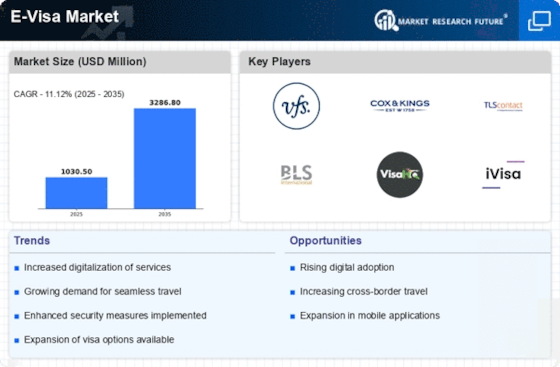-
EXECUTIVE SUMMARY 14
-
MARKET ATTRACTIVENESS ANALYSIS 16
-
MARKET INTRODUCTION 17
-
DEFINITION 17
-
SCOPE OF THE STUDY 17
-
RESEARCH OBJECTIVE 17
-
MARKET STRUCTURE 17
-
RESEARCH METHODOLOGY 19
-
MARKET DYNAMICS 26
-
INTRODUCTION 26
-
DRIVERS 27
- INCREASING INTERNATIONAL TRAVEL AND TOURISM 27
- FLEXIBILITY AND SCALABILITY TO MEET CHANGING NEEDS 27
- GOVERNMENT INITIATIVES FOCUSING ON THE IMPLEMENTATION OF E-VISA SYSTEMS TO ENHANCE USER EXPERIENCE IN RECENT PAST 28
- DRIVERS IMPACT ANALYSIS 29
-
RESTRAINTS 29
- GOVERNMENT AGENCIES DEVELOPING THEIR OWN E-VISA SOLUTIONS TO CAUSE RESTRAIN FOR GROWTH OF PRIVATE PLAYERS 29
- NATIONAL SECURITY AND COMPLIANCE WITH INTERNATIONAL LAW COUPLED WITH TECHNICAL REQUIREMENTS TO RESTRICT GROWTH OF MARKET IN TARGETED ECONOMIES 30
-
OPPORTUNITIES 31
- DEMAND FROM EMERGING ECONOMIES 31
- OFFERING VALUE-ADDED SERVICES TO CLIENTS 32
-
IMPACT ANALYSIS OF COVID-19 32
- COVID 19 IMPACT ON TRAVEL INDUSTRY 32
- INCREASING NEED FOR "ONLINE" VISA PROCESS ACROSS THE GLOBE 33
- COVID 19 IMPACT ON OVERALL MARKET Y-O-Y IN 2020-2022 33
- VACCINATION REQUIREMENTS 34
-
MARKET FACTOR ANALYSIS 35
-
VALUE CHAIN ANALYSIS 35
-
PORTER''S FIVE FORCES MODEL 36
- THREAT OF NEW ENTRANTS 37
- BARGAINING POWER OF SUPPLIERS 37
- THREAT OF SUBSTITUTES 38
- BARGAINING POWER OF BUYERS 38
- INTENSITY OF RIVALRY 39
-
GLOBAL E-VISA OFFERING ANALYSIS 39
-
E Visa Market, BY COMPONENT 40
-
OVERVIEW 40
- E Visa Market, BY COMPONENT, 2019–2032 (USD MILLION) 41
-
SOFTWARE 41
-
SERVICES 42
-
E Visa Market, BY APPLICATION 43
-
OVERVIEW 43
- E Visa Market, BY APPLICATION, 2019–2032 (USD MILLION) 44
-
TRAVELLING 44
-
STUDENTS/EDUCATIONAL VISA 44
-
GOVERNMENT/FOREIGN AFFAIRS 44
-
OTHERS 45
-
E Visa Market, BY PLATFORM 46
-
OVERVIEW 46
- E Visa Market, BY PLATFORM, 2019–2032 (USD MILLION) 47
-
DESKTOP 47
-
SMARTHONE 47
-
TABLETS 47
-
E Visa Market, BY REGION 48
-
OVERVIEW 48
- E Visa Market, BY REGION, 2023 VS 2032 (USD MILLION) 48
- E Visa Market, BY REGION, 2019–2032 (USD MILLION) 49
-
NORTH AMERICA 49
- NORTH AMERICA: E Visa Market, BY COUNTRY, 2019–2032 (USD MILLION) 51
- E Visa Market, BY COMPONENT, 2019–2032 (USD MILLION) 51
- E Visa Market, BY APPLICATION, 2019–2032 (USD MILLION) 52
- E Visa Market, BY PLATFORM, 2019–2032 (USD MILLION) 53
- US 54
- CANADA 55
- MEXICO 56
-
EUROPE 57
- EUROPE: E Visa Market, BY COUNTRY, 2019–2032 (USD MILLION) 58
- E Visa Market, BY COMPONENT, 2019–2032 (USD MILLION) 59
- E Visa Market, BY APPLICATION, 2019–2032 (USD MILLION) 60
- E Visa Market, BY PLATFORM, 2019–2032 (USD MILLION) 61
- GERMANY 62
- FRANCE 63
- UK 64
- REST OF EUROPE 65
-
ASIA-PACIFIC 66
- ASIA-PACIFIC: E Visa Market, BY COUNTRY, 2019–2032 (USD MILLION) 67
- E Visa Market, BY COMPONENT, 2019–2032 (USD MILLION) 68
- E Visa Market, BY APPLICATION, 2019–2032 (USD MILLION) 69
- E Visa Market, BY PLATFORM, 2019–2032 (USD MILLION) 69
- CHINA 70
- JAPAN 71
- INDIA 72
- SOUTH KOREA 73
- REST OF ASIA-PACIFIC 74
-
MIDDLE EAST & AFRICA 75
- MIDDLE EAST & E Visa Market, BY COMPONENT, 2019–2032 (USD MILLION) 75
- MIDDLE EAST & E Visa Market, BY APPLICATION, 2019–2032 (USD MILLION) 76
- MIDDLE EAST & E Visa Market, BY PLATFORM, 2019–2032 (USD MILLION) 77
-
SOUTH AMERICA 78
- E Visa Market, BY COMPONENT, 2019–2032 (USD MILLION) 78
- E Visa Market, BY APPLICATION, 2019–2032 (USD MILLION) 79
- E Visa Market, BY PLATFORM, 2019–2032 (USD MILLION) 80
-
COMPETITIVE LANDSCAPE 81
-
OVERVIEW 81
-
COMPETITIVE BENCHMARKING 82
-
MARKET SHARE ANALYSIS 83
-
KEY DEVELOPMENT IN THE GLOBAL E-VISA MARKET 84
- PRODUCT LAUNCHES/SERVICE 84
- CONTRACTS & AGREEMENTS 84
- EXPANSIONS/ JOINT VENTURE & INVESTMENTS 85
- PARTNERSHIP & COLABORATION 85
-
COMPANY PROFILE 86
-
MÜHLBAUER GROUP 86
- COMPANY OVERVIEW 86
- FINANCIAL OVERVIEW 86
- PRODUCTS OFFERED 87
- PRODUCTS/SOLUTIONS/SERVICES OFFERED 87
- KEY DEVELOPMENTSS 87
- SWOT ANALYSIS 88
- KEY STRATEGIES 88
-
BLS INTERNATIONAL 89
- COMPANY OVERVIEW 89
- FINANCIAL OVERVIEW 90
- PRODUCTS/SOLUTIONS/SERVICES OFFERED 90
- SWOT ANALYSIS 93
- KEY STRATEGIES 93
-
CANADIAN BANK NOTE COMPANY, LIMITED (CBN) 94
- COMPANY OVERVIEW 94
- FINANCIAL OVERVIEW 94
- PRODUCTS/SOLUTIONS/SERVICES OFFERED 94
- KEY DEVELOPMENTS 95
-
CSERVE TECHNOLOGIES 95
- COMPANY OVERVIEW 95
- FINANCIAL OVERVIEW 95
- PRODUCTS/SOLUTIONS/SERVICES OFFERED 95
- KEY DEVELOPMENTS 95
-
IVISA.COM 96
- COMPANY OVERVIEW 96
- FINANCIAL OVERVIEW 96
- PRODUCTS/SOLUTIONS/SERVICES OFFERED 96
- KEY DEVELOPMENTS 97
- SWOT ANALYSIS 97
- KEY STRATEGIES 97
-
VISAHQ 98
- COMPANY OVERVIEW 98
- FINANCIAL OVERVIEW 98
- PRODUCTS/SOLUTIONS/SERVICES OFFERED 98
- KEY DEVELOPMENTS 98
-
TRAVISA VISA SERVICES, INC. 99
- COMPANY OVERVIEW 99
- FINANCIAL OVERVIEW 99
- PRODUCTS/SOLUTIONS/SERVICES OFFERED 99
- KEY DEVELOPMENTS 100
-
ITSEASY PASSPORT & VISA SERVICES 101
- COMPANY OVERVIEW 101
- FINANCIAL OVERVIEW 101
- PRODUCTS/SOLUTIONS/SERVICES OFFERED 101
- KEY DEVELOPMENTS 102
-
GEMALTO NV (A THALES COMPANY) 103
- COMPANY OVERVIEW 103
- FINANCIAL OVERVIEW 103
- PRODUCTS/SOLUTIONS/SERVICES OFFERED 103
- KEY DEVELOPMENTS 103
- SWOT ANALYSIS 104
- KEY STRATEGIES 104
-
4G IDENTITY SOLUTIONS PVT. LTD (4GID) 105
- COMPANY OVERVIEW 105
- FINANCIAL OVERVIEW 105
- PRODUCTS/SOLUTIONS/SERVICES OFFERED 105
- KEY DEVELOPMENTS 106
- KEY STRATEGIES 106
-
VFS GLOBAL GROUP 107
- COMPANY OVERVIEW 107
- FINANCIAL OVERVIEW 107
- PRODUCTS/SOLUTIONS/SERVICES OFFERED 107
- KEY DEVELOPMENTS 107
- KEY STRATEGIES 107
-
SECURIPORT LLC 109
- COMPANY OVERVIEW 109
- FINANCIAL OVERVIEW 109
- PRODUCTS/SOLUTIONS/SERVICES OFFERED 109
- KEY DEVELOPMENTS 109
- KEY STRATEGIES 109
-
SWISS AUTHENTIS S.A. 111
- COMPANY OVERVIEW 111
- FINANCIAL OVERVIEW 111
- PRODUCTS/SOLUTIONS/SERVICES OFFERED 111
- KEY DEVELOPMENTS 111
- KEY STRATEGIES 111
-
LIST OF TABLES
-
MARKET SYNOPSIS 15
-
E Visa Market, BY COMPONENT, 2019–2032 (USD MILLION) 41
-
E Visa Market, BY APPLICATION, 2019–2032 (USD MILLION) 44
-
E Visa Market, BY PLATFORM, 2019–2032 (USD MILLION) 47
-
E Visa Market, BY REGION, 2019–2032 (USD MILLION) 49
-
E Visa Market, BY COUNTRY, 2019–2032 (USD MILLION) 51
-
E Visa Market, BY COMPONENT, 2019–2032 (USD MILLION) 51
-
E Visa Market, BY APPLICATION, 2019–2032 (USD MILLION) 52
-
E Visa Market, BY PLATFORM 2019–2032 (USD MILLION) 53
-
E Visa Market, BY COMPONENT, 2019–2032 (USD MILLION) 54
-
E Visa Market, BY APPLICATION, 2019–2032 (USD MILLION) 54
-
E Visa Market, BY PLATFORM 2019–2032 (USD MILLION) 54
-
E Visa Market, BY COMPONENT, 2019–2032 (USD MILLION) 55
-
E Visa Market, BY APPLICATION, 2019–2032 (USD MILLION) 55
-
E Visa Market, BY PLATFORM 2019–2032 (USD MILLION) 55
-
E Visa Market, BY COMPONENT, 2019–2032 (USD MILLION) 56
-
E Visa Market, BY APPLICATION, 2019–2032 (USD MILLION) 56
-
E Visa Market, BY PLATFORM 2019–2032 (USD MILLION) 56
-
E Visa Market, BY COUNTRY, 2019–2032 (USD MILLION) 58
-
E Visa Market, BY COMPONENT, 2019–2032 (USD MILLION) 59
-
E Visa Market, BY APPLICATION, 2019–2032 (USD MILLION) 60
-
E Visa Market, BY PLATFORM 2019–2032 (USD MILLION) 61
-
E Visa Market, BY COMPONENT, 2019–2032 (USD MILLION) 62
-
E Visa Market, BY APPLICATION, 2019–2032 (USD MILLION) 62
-
E Visa Market, BY PLATFORM 2019–2032 (USD MILLION) 62
-
E Visa Market, BY COMPONENT, 2019–2032 (USD MILLION) 63
-
E Visa Market, BY APPLICATION, 2019–2032 (USD MILLION) 63
-
E Visa Market, BY PLATFORM 2019–2032 (USD MILLION) 63
-
E Visa Market, BY COMPONENT, 2019–2032 (USD MILLION) 64
-
E Visa Market, BY APPLICATION, 2019–2032 (USD MILLION) 64
-
E Visa Market, BY PLATFORM 2019–2032 (USD MILLION) 64
-
E Visa Market, BY COMPONENT, 2019–2032 (USD MILLION) 65
-
E Visa Market, BY APPLICATION, 2019–2032 (USD MILLION) 65
-
E Visa Market, BY PLATFORM 2019–2032 (USD MILLION) 65
-
E Visa Market, BY COUNTRY, 2019–2032 (USD MILLION) 67
-
E Visa Market, BY COMPONENT, 2019–2032 (USD MILLION) 68
-
E Visa Market, BY APPLICATION, 2019–2032 (USD MILLION) 69
-
E Visa Market, BY PLATFORM 2019–2032 (USD MILLION) 69
-
E Visa Market, BY COMPONENT, 2019–2032 (USD MILLION) 70
-
E Visa Market, BY APPLICATION, 2019–2032 (USD MILLION) 70
-
E Visa Market, BY PLATFORM 2019–2032 (USD MILLION) 70
-
E Visa Market, BY COMPONENT, 2019–2032 (USD MILLION) 71
-
E Visa Market, BY APPLICATION, 2019–2032 (USD MILLION) 71
-
E Visa Market, BY PLATFORM 2019–2032 (USD MILLION) 71
-
E Visa Market, BY COMPONENT, 2019–2032 (USD MILLION) 72
-
E Visa Market, BY APPLICATION, 2019–2032 (USD MILLION) 72
-
E Visa Market, BY PLATFORM 2019–2032 (USD MILLION) 72
-
E Visa Market, BY COMPONENT, 2019–2032 (USD MILLION) 73
-
E Visa Market, BY APPLICATION, 2019–2032 (USD MILLION) 73
-
E Visa Market, BY PLATFORM 2019–2032 (USD MILLION) 73
-
E Visa Market, BY COMPONENT, 2019–2032 (USD MILLION) 74
-
E Visa Market, BY APPLICATION, 2019–2032 (USD MILLION) 74
-
E Visa Market, BY PLATFORM 2019–2032 (USD MILLION) 74
-
MIDDLE EAST & E Visa Market, BY COMPONENT, 2019–2032 (USD MILLION) 75
-
MIDDLE EAST & AFRICA'



















Leave a Comment